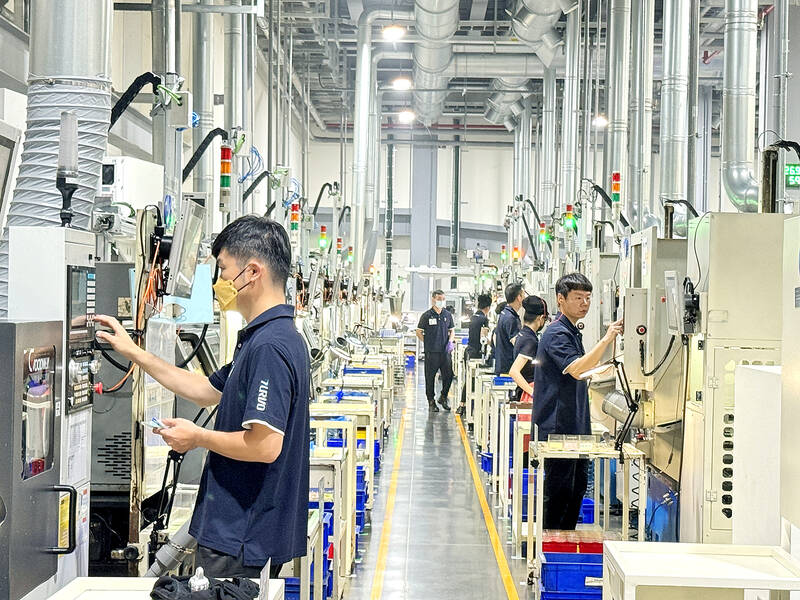The manufacturing industry’s business climate monitor stayed “green” in August, suggesting steady growth, as local tech firms benefited from inventory demand ahead of new product launches by global technology brands, the Taiwan Institute of Economic Research (TIER, 台灣經濟研究院) said yesterday.
It is the fifth straight “green” signal, even though manufacturers overseas remained weighed by a slowdown, the Taipei-based think tank said.
The composite index compiled by the TIER increased 0.29 points from the previous month to 14.1, as the readings on demand and selling prices weakened, but the scores on the operating environment, inputs and production costs climbed modestly, it said.

Photo: Amy Yang, Taipei Times
The mixed results came as local electronics suppliers gained business traction ahead of the releases of a new iPhone series and Apple watches last month, it said.
Taiwanese firms are responsible for making the new iPhones’ camera lenses, chips and other components, the TIER said, adding that the advent of the Christmas season also ramps up business for electronics used in notebook computers, e-readers and peripheral gadgets.
The institute’s data showed the input score added 0.8 points, and both the operating environment and production costs inched up 0.13 points, while demand and selling price lost 0.13 points and 0.65 points respectively.
Business sentiment fell in the first half of August due to concerns about a potential hard landing in the US economy, but the unease subdued after the US job market proved resilient, a relief for tech exporters, the institute said.
By sector, the business monitor flashed the second boom signal for local manufacturers of electronic components, as evidenced by record-high export orders and outbound shipments, as well as strong industrial production, the TIER said.
The recovery extended to other sectors, although in an uneven manner.
Machinery equipment makers reported a business uptick, thanks to demand from semiconductor firms, but base metal suppliers struggled with listless demand and price competition from abroad, it said.
Domestic makers of textile products came out of the woods on the back of the high sales season and the local currency’s depreciation, reversing a hit linked to China’s termination of favorable trade terms, the institute said.
Food and beverage suppliers received seasonal support over the summer vacation and Ghost Month, which fell mostly in August this year, it said.
Ghost Month is believed to be the main reason for a 17 percent decline in new vehicle sales, it added.
However, local makers of auto parts emerged from a business retreat, helped by restocking demand from automakers in the North America market, the institute said.

United Microelectronics Corp (UMC, 聯電) expects its addressable market to grow by a low single-digit percentage this year, lower than the overall foundry industry’s 15 percent expansion and the global semiconductor industry’s 10 percent growth, the contract chipmaker said yesterday after reporting the worst profit in four-and-a-half years in the fourth quarter of last year. Growth would be fueled by demand for artificial intelligence (AI) servers, a moderate recovery in consumer electronics and an increase in semiconductor content, UMC said. “UMC’s goal is to outgrow our addressable market while maintaining our structural profitability,” UMC copresident Jason Wang (王石) told an online earnings

Gudeng Precision Industrial Co (家登精密), the sole extreme ultraviolet (EUV) pod supplier to Taiwan Semiconductor Manufacturing Co (TSMC, 台積電), is aiming to expand revenue to NT$10 billion (US$304.8 million) this year, as it expects the artificial intelligence (AI) boom to drive demand for wafer delivery pods and pods used in advanced packaging technology. That suggests the firm’s revenue could grow as much as 53 percent this year, after it posted a 28.91 percent increase to NT$6.55 billion last year, exceeding its 20 percent growth target. “We usually set an aggressive target internally to drive further growth. This year, our target is to

The TAIEX ended the Year of the Dragon yesterday up about 30 percent, led by contract chipmaker Taiwan Semiconductor Manufacturing Co (TSMC, 台積電). The benchmark index closed up 225.40 points, or 0.97 percent, at 23,525.41 on the last trading session of the Year of the Dragon before the Lunar New Year holiday ushers in the Year of the Snake. During the Year of the Dragon, the TAIEX rose 5,429.34 points, the highest ever, while the 30 percent increase in the year was the second-highest behind only a 30.84 percent gain in the Year of the Rat from Jan. 25, 2020, to Feb.

Cryptocurrencies gave a lukewarm reception to US President Donald Trump’s first policy moves on digital assets, notching small gains after he commissioned a report on regulation and a crypto reserve. Bitcoin has been broadly steady since Trump took office on Monday and was trading at about US$105,000 yesterday as some of the euphoria around a hoped-for revolution in cryptocurrency regulation ebbed. Smaller cryptocurrency ether has likewise had a fairly steady week, although was up 5 percent in the Asia day to US$3,420. Bitcoin had been one of the most spectacular “Trump trades” in financial markets, gaining 50 percent to break above US$100,000 and